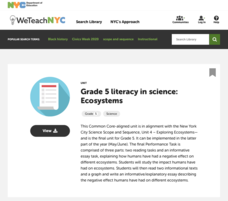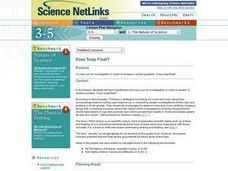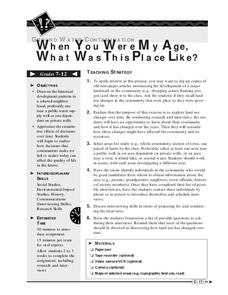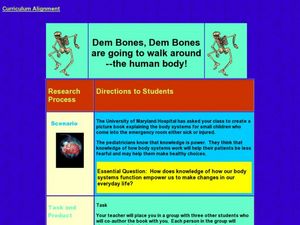Channel Islands Film
Arlington Springs Man: Lesson Plan 1
Learning to craft quality questions is a skill that can be taught. Class members use the Question Formulation Technique to learn how to create and refine both closed-ended and open-ended questions. They then view West of the West's...
Michigan State University
Interviewing
Do you have pests at your school? Find out through a series of interviews with school personnel. Scholars visit a variety of knowledgable individuals to ask them questions, record their answers, and present their findings to their peers.
EngageNY
Making Inferences About Informational Text: Science Talk on How My Insect Contributes to the Rainforest Ecosystem
We need to talk. Learners participate in a science talk by discussing the idea of how insects are important to the rainforest. They record notes about their conversations as they talk. For homework, pupils add to their field journals.
EngageNY
Interviewing Meg Lowman: What Does it Mean to be a Responsible Scientist? (Pages 37–39)
Can I ask you something? Scholars read about the night walk on pages 37-39 of The Most Beautiful Roof in the World. After discussing the text with their group, they work together to create interview questions they would ask Meg Lowman....
EngageNY
End of Unit Assessment Part II: Science Talk
Scholars complete Part 2 of their end of unit assessment by having a science talk. Pupils pair up to answer questions about what makes a natural disaster. As one learner talks, the other records what is said. They then trade places.
New York City Department of Education
Grade 5 Literacy in Science: Ecosytems
How do humans affect ecosystems? Learners read two articles and interpret a graph to develop essays on the human impact on ecosystems. They read about human impact on tigers and manatees as a basis for their overarching papers.
Curated OER
Sun and Shadows
Why do shadows look different in the summer than in the winter? What causes day and night? How can a sundial be used to tell time? Answer these questions and more through two engaging lessons about light and shadows. Fourth and fifth...
Curated OER
Acid Rain
Create a simulation of acid rain in your classroom with lemon juice and bean plants to help kids study the effects of pollution on plants. In addition, learners will listen to a story and write responses based on guiding questions.
Smarter Balanced
Zoos
How do the experiences of animals living in zoos differ from animals living in the wild? To prepare for a performance assessment on this question, class members are introduced to key concepts and vocabulary, and then groups use a Venn...
Curated OER
Comparisons
For this conversations worksheet, students complete 8 question and answer conversations by writing the letter of the correct phrase from the word bank.
Curated OER
Designing the Experiment and Answering the Question
Students investigate scientific methods by analyzing an article from the Natural Inquirer. In this data analysis instructional activity, students read an article from the magazine and discuss at least 2 scientific methods that could be...
Curated OER
Are You Sure You've Got the Right Answer?
Young researchers work through the research cycle. They question, plan, gather, sort, synthesize, and evaluate the materials they collect at the library. There are web supplements for this lesson.
Smarter Balanced
Classifying Vertebrates
What features do scientists use to classify animals into groups? Class groups examine a series of paired images of vertebrates (a bass and a trout, a toad and a newt, a crocodile and a tortoise, an owl and a robin, a tiger and a bear)...
Curated OER
Does Soap Float?
Students form hypotheses and carry out an investigation in order to answer a central question: Does soap float? The focus of this lesson is on scientific inquiry, but it incorporates scientific topics such as sinking and floating.
Curated OER
Oklahoma Stone Soup
Students discover the history of the Oklahoma Territory and what foods cowboys used to eat while on the move. In this culinary lesson, students read the ingredients to Oklahoma Stone Soup and prepare them in a crock pot over the course...
Curated OER
You are Uniquely You
Students compare and contrast simple machines and their functions. In this cross-curriculum science simple machines lesson, students observe examples and read about simple machines, then use body movement to demonstrate how machines...
Curated OER
Pollution is Not a Solution
Students explore the environment by completing science worksheets in class. In this water conservation lesson, students identify ways water is used in our society and how we abuse the privilege. Students discuss methods to reduce water...
Curated OER
When You Were My Age, What Was This Place Like?
Young scholars discover how land use in their community has changed. In this community and ecology instructional activity, students scan old newspapers to find articles about the development of community land. Young scholars discuss and...
Curated OER
Natural Wonder Superlative Activity
Learners explore the natural wonders of the world. In this natural wonders of the world lesson, students share facts using superlative adjectives. Learners recieve fact cards and memorize the information. Students then go to others in...
Curated OER
Dem Bones, Dem Bones are Going to Walk Around: The Human Body
Students explore human anatomy by creating a science book in class. In this skeletal structure instructional activity, students identify the different body systems such as muscular, nervous, skeletal, and digestive. Students create a...
Curated OER
Cyclones
Students explore Earth science by researching natural disasters in class. In this cyclone lesson, students discuss the creation of cyclones and what their potential destruction can be in the wrong environment. Students read assigned text...
Curated OER
Earth and Space Science: Exploring Earthquakes
Students explore earthquakes. In this earthquake lesson, students research earthquakes and identify where they take place. Students use map skills to track down earthquake locations. There are internet sites suggested in this lesson.
Smarter Balanced
Environmental Interdependence (Environmental Awareness)
Whether introducing a study of environment awareness or preparing your classes for a performance task related to environmental interdependence, you will find this resource useful. Key terms and concepts are introduced so that all...
Novelinks
The True Confessions of Charlotte Doyle: Problematic Situations
When is it okay to go against authority and what can happen if you do? This is the leading question in this activity to accompany your classroom reading of The True Confessions of Charlotte Doyle by Avi. After reading chapter eight,...

























